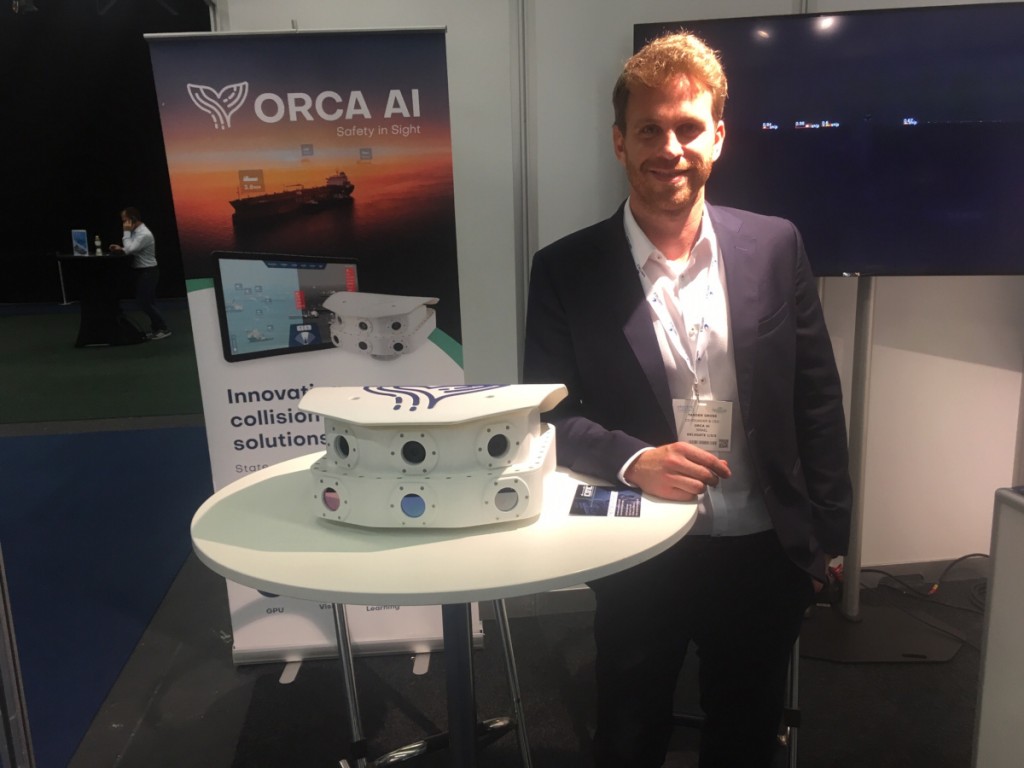Autonomous and Electric Powered Yara Birkleland Will Be Delivered in 2020
The Yara Birkleland, expected to be delivered in 2020, will be the first autonomous and all electric powered container ship in the world, according to Morten Stanger, vice president of marketing for Norway-based Kongsberg.
This could offer a blueprint for the eventual transition of the world’s shipping to battery and hydrogen fuel cells that generate zero emissions.
At the Electric and Hybrid Marine Expo in Amsterdam on June 25th, Stanger explained to AJOT, that the new autonomously operated ship will deploy next generation maritime technologies:
- Collision avoidance technology
- Sensors monitoring hull and vessel stresses to predict preventative maintenance
- Triple redundancy communication to provide “failsafe remote and autonomous running.”
- Security from hacking
- Electric power using batteries to provide zero emissions.
- Digital Twin system ”where data including weather, currents, tides…is integrated with detailed physical and operational area models.”
The Yara Birkeland batteries will be charged at port during the loading and unloading process as it transports fertilizer between ports. The service will eliminate 40,000 truck trips per year, Stanger says.
Kongsberg’s merger with Rolls Royce is increasing the company’s technical expertise including design, system integration and advanced propulsion equipment.
Stanger said the vessel will operate with a small crew initially so as to test and check the operability of its equipment before it goes into autonomous operation in late 2020.
The ship will operate with a 7,000 kW/hour capacity. The owner is Yara Norge.
Dean Jennings, vice president e-marine for Swiss-based Leclanche Energy Storage, says his company will be providing batteries for the Yara Birkeland. The company manufactures its own batteries. This allows it to maximize performance compared to battery makers who source batteries from outside suppliers, he says. Leclanche has designed an advanced system for safety from overheating and control systems to monitor charging.

By keeping batteries charged within an optimum range, the battery’s life is extended and the return on investment is enhanced for the owners of the Yara Birkeland.
The Yara Birkeland will operate within a repetitive and short distance route.
For ocean shipping, there will be a need for technologies such as Orca AI, designed for ship collision avoidance systems sailing to the world’s ports and on the open seas.
Yarden Gross, co-founder of Orca AI and co-founder Dor Raviv told AJOT they are developing collision avoidance technology that is essential for the future development of autonomous ships. At the same time, they believe their technology will help officers and crew on a ship’s bridge receive enhanced warning about possible ships on the horizon and other hazards that will supplement radar and improve safety at sea.
Data is being developed by a fleet of ships sailing around the world “that is being fed into algorithms for the Orca system,” Gross said.
Kilian Hoffman, international account manager for EST-Floattech, based in The Netherlands, says that his company is providing battery power in collaboration with an international consortium. The consortium is building “the first hydrogen and battery powered pushing barge that will transport Siemens gas turbines from Berlin to Hamburg. As a result of the proximity of residential areas to harbor basins, the battery- powered system will reduce noise levels by 70% compared to diesel engines. The new push barge could provide 40% fuel savings compared to diesel engines for inland waterways vessels as well as reducing emissions.”
Koen Boerdijk, international account manager says EST-Floattech is also the battery provider for a new Sendo Liner inland waterway vessel built for Sendo Shipping. The 564-kWh lithium ion battery pack will provide peak power savings for the vessel as it transports containers to and from the Ports of Rotterdam, Amsterdam and Groningen in the north of Holland. The peak power savings refers to inefficiencies a diesel- powered engine experiences during slowing and stopping that a battery system can help eliminate. Boerdijk estimates that batteries will help the Sendo Liner reduce its fuel consumption by at least 30%.
Sebastian van der Meer, managing director Sendo Shipping, said that once “a company starts offering interchangeable battery containers, we’ll be able to connect directly to the system so that the vessel can sail emission-free longer, or maybe all the time.”
Right now, batteries have to be charged in port which is a slower process than switching out a container of spent batteries for a container of freshly charged batteries.
Fokke van der Veen, director of operations for Future Proof Shipping in Rotterdam is acquiring an existing inland waterway vessel and will replace its diesel-powered engine with a hydrogen fuel cell system.
Van der Veen told AJOT that “the inland waterway tonnage in Europe is huge but many owners may not have the money to buy a new vessel…They can afford to replace a diesel engine with a hydrogen fuel cell system that will be easier to maintain and generate zero emissions.”
As regulations in Europe accelerate for the use of zero emission vessels, Future Proof hopes to show that owners who invest in hydrogen fuel cells now will increase the value of existing vessels compared to current diesel powered vessels that will lose value as carbon emission regulations get tougher.
Dick Bjorkqvist, global sales manager for ABB, based in Finland told AJOT that ABB continues to work with Vancouver, Canada based Ballard Power Systems to produce hydrogen fuel cell modules.
In May, the two companies announced a new collaboration for Ballard to produce two 200 kilowatt fuel cell modules for a river push barge to be deployed in France on the Rhone river.
© Copyright 1999–2024 American Journal of Transportation. All Rights Reserved

